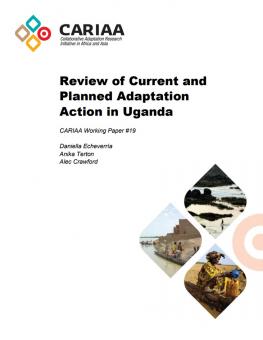
Review of Current and Planned Adaptation Action in Uganda
This report summarizes the climate risks and vulnerable sectors in Uganda, providing an overview of its current and upcoming efforts to implement climate change adaptation policies and initiatives at the national and sub-national levels.
As described in this report, climate change challenges Uganda’s efforts to become a middle-income country by 2040.
Rising temperatures and variable rainfall patterns are expected to negatively affect important sources of livelihoods and economic activity, including commercial and subsistence crop production, livestock, forestry and fisheries. These changes are of particular concern for Uganda’s semi-arid northern and northeastern regions, as well as its “cattle corridor.” Concerted adaptation and poverty reduction efforts will be required in these areas to build resilience to climate change. The Government of Uganda has recognized climate change as a risk to its national development plans and responded by developing a National Climate Change Policy as well as a supporting political structure for its implementation. A process to develop a National Adaptation Plan is under way. The majority of international financial support for adaptation is concentrated in the agriculture and water sectors. There are also ongoing projects that aim to strengthen governance capacity, provide climate information and improve disaster risk management. Gaps remain in mainstreaming adaptation into sectoral strategies and plans, as well as decision-making at the district level. Greater investment could also be made to improve adaptive capacity in the fisheries, forestry, energy and health sectors. These issues are explored more fully in this report, which is one in a series of country reviews prepared by IISD in support of the Collaborative Adaptation Research Initiative in Africa and Asia (CARIAA).
Participating experts
You might also be interested in
How to Make Nature-Based Solutions for Adaptation Work for Everyone
Effective nature-based solutions (NbS) for adaptation start with integrated climate risk assessments. These take-aways will help practitioners plan for inclusive and sustainable NbS.
Trends in Adaptation Planning: Observations from a recent stock-taking review
This brief provides an overview of observed trends in adaptation action that emerged from a standardized review of efforts in 15 African and Asian countries.
Review of Current and Planned Adaptation Action in Bangladesh
Review of Current and Planned Adaptation Action in India
This report summarizes the climate risks and vulnerable sectors in India, while providing an overview of policies and initiatives introduced at the national and sub-national levels to advance the country’s adaptation actions.